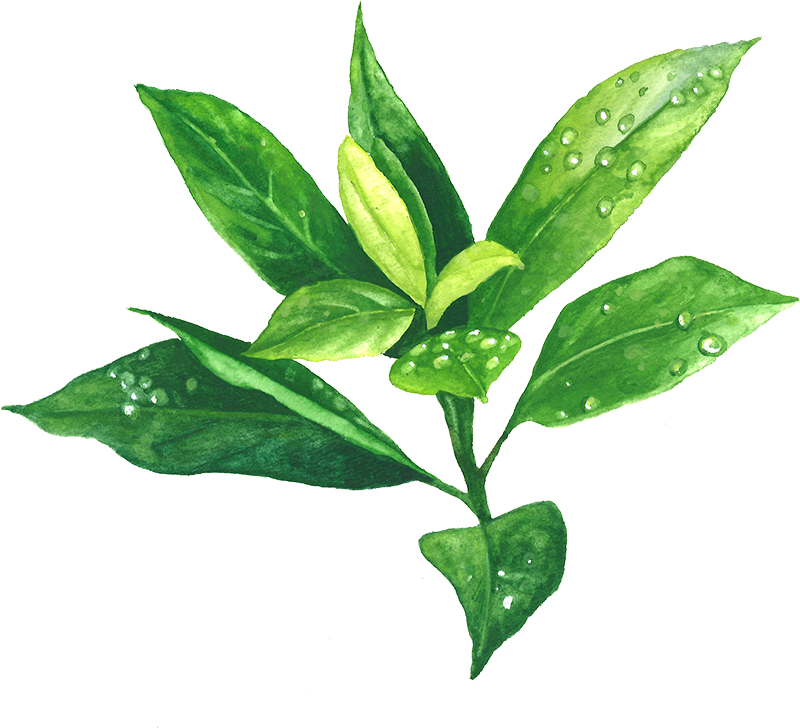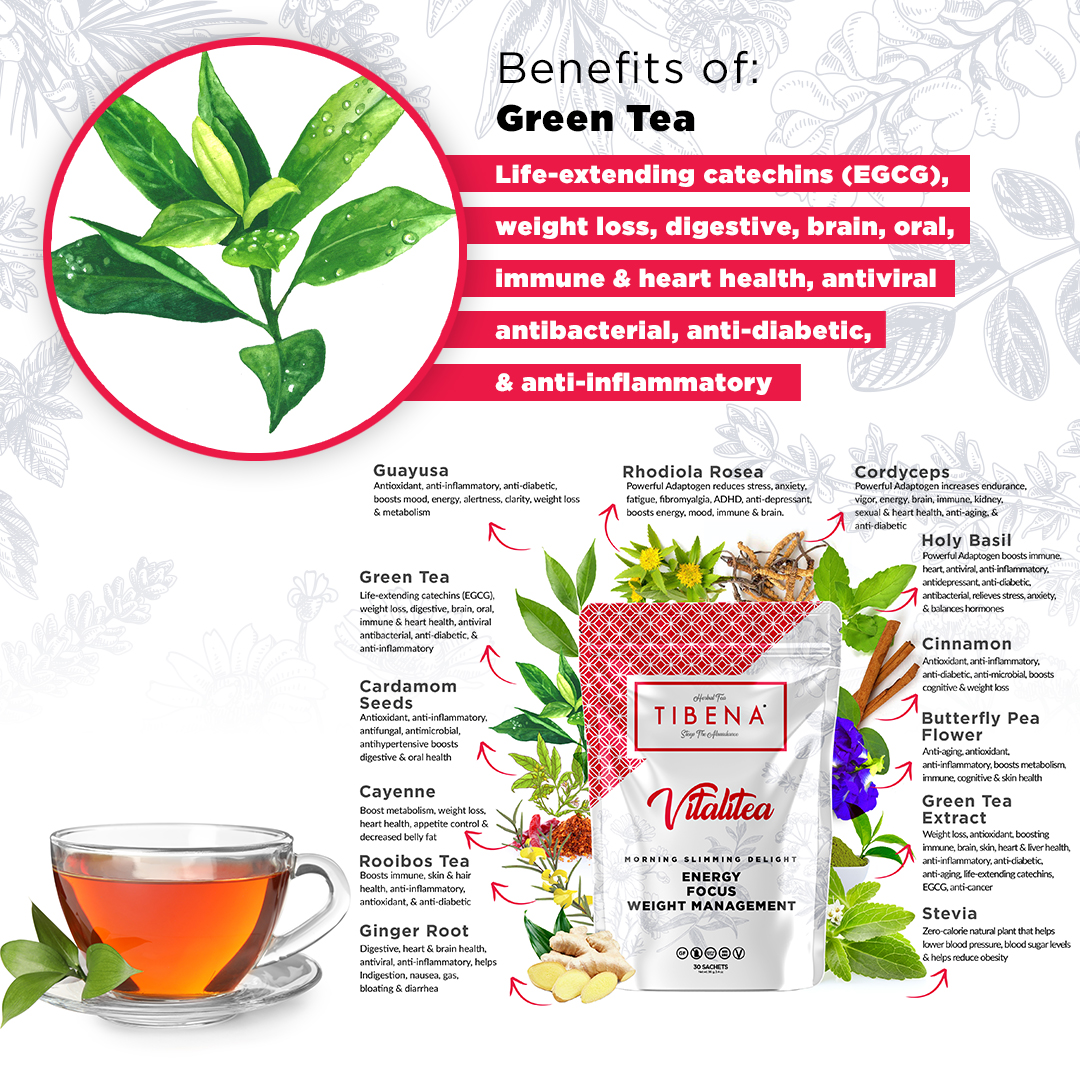
Studies have shown Potential Benefits:
Life-extending catechins,(EGCG), weight loss, digestive, neuro-protective oral, immune & heart health, anti-viral, anti-bacterial, anti-diabetic & anti-inflammatory.
Green Tea
What is it?
What is it? Green tea originates from the Camellia Sinensis leaves and buds that have not undergone the same fermentation and oxidation process used to make oolong teas and black teas.
Green Tea contains many essential vitamins and minerals with up to 30 percent polyphenols by weight. Catechins are antioxidants that help prevent cell damage. The exceptional compound in Green Tea is “EGCG” (Epigallocatechin Gallate). These Natural Antioxidants help prevent free radical damage thus helping to prevent premature aging.
Green Tea is an Adaptogen Companion.
Life extending catechins,(EGCG), weight loss, digestive, oral, immune & heart health, anti-viral, anti-bacterial, anti-inflammatory, neuro-protective, & helps balance blood sugar.

https://www.ncbi.nlm.nih.gov/pubmed/27824892 – An analysis of 26 studies in over 52,500 people with daily consumption of teas high in EGCG (green tea) — to a 35% lower risk of brain disorders, including Alzheimer’s disease
https://www.ncbi.nlm.nih.gov/pubmed/12428980 – Jasmine tea made from green tea may lower your risk of type 2 diabetes containing EGCG, which may help your body use insulin more effectively and reduce blood sugar levels.
https://www.ncbi.nlm.nih.gov/pubmed/19437116 – A comprehensive review of observational studies found that women who drank the most green tea had an approximately 20–30% lower risk of developing breast cancer, one of the most common cancers in women
https://www.ncbi.nlm.nih.gov/pubmed/23803878 – An analysis of 17 studies in 1,133 people showed that green tea consumption significantly reduced fasting blood sugar and insulin levels
https://www.ncbi.nlm.nih.gov/pubmed/25052177 – An analysis of 12 studies in more than 760,000 people found that drinking 3 cups (710 ml) or more of tea daily was linked to a 16% lower risk of type 2 diabetes
https://www.ncbi.nlm.nih.gov/pubmed/18296347 – https://www.ncbi.nlm.nih.gov/pubmed/19325799
Studies show ECGC in green tea reduced tumor size, stimulated cancer cell death, and suppressed the growth and spread of cancer cells.
https://academic.oup.com/aje/article/167/1/71/185454 – One study observed that men drinking green tea had a lower risk of advanced prostate cancer
https://www.ncbi.nlm.nih.gov/pubmed/28454102 – An analysis of 29 studies showed that those drinking green tea were around 42% less likely to develop colorectal cancer
https://www.ncbi.nlm.nih.gov/pubmed/15350981 neuro-protective
https://www.ncbi.nlm.nih.gov/pmc/articles/PMC6493995/ – neuro-protective
https://www.ncbi.nlm.nih.gov/pubmed/26092629 – neuro-protective – Green tea can have various positive effects on the brain. Helping to reduce the risk of dementia, a common neurodegenerative disorder in older adults.
https://www.ncbi.nlm.nih.gov/pubmed/16968850 – Longevity – Researchers studied 40,530 Japanese adults over 11 years. Those who drank 5 or more cups of green tea a day were significantly less likely to die during the study period.
https://www.sciencedirect.com/science/article/abs/pii/S1047279709001653 – Longevity – 14,001 older Japanese individuals found that those who drank the most green tea were 76% less likely to die during the 6-year study period
https://www.ncbi.nlm.nih.gov/pmc/articles/PMC5537891/ – Theanine is believed to be the main sleep-promoting compound in green tea. It works by reducing stress-related hormones and neuron excitement in your brain, which allows your brain to relax
https://www.ncbi.nlm.nih.gov/pmc/articles/PMC5703787/ – Evidence suggests that drinking 3–4 cups of low-caffeinated green tea throughout the day may reduce fatigue and levels of stress markers, as well as improve sleep quality.
https://www.ncbi.nlm.nih.gov/pmc/articles/PMC2855614/#B35 – Beneficial effects of green tea: A literature review
and Composition information from 119 research papers.
https://www.ncbi.nlm.nih.gov/pubmed/1614996 – Antimutagenic and anticarcinogenic effects – anti-cancer
https://www.ncbi.nlm.nih.gov/pubmed/15331020 – Diabetes – Effect of green tea on blood glucose levels and serum proteomic patterns in diabetic (db/db) mice and on glucose metabolism in healthy humans –
https://www.ncbi.nlm.nih.gov/pubmed/10200295 – Joint Pain – Prevention of collagen-induced arthritis in mice by a polyphenolic fraction from green tea
https://www.ncbi.nlm.nih.gov/pubmed/12587987 – Antioxidant
https://www.ncbi.nlm.nih.gov/pubmed/2677434 – Antibacterial and bactericidal activities of Japanese green tea
https://www.ncbi.nlm.nih.gov/pubmed/14688042 – Antifungal – Multiple effects of green tea catechin on the antifungal activity of antimycotics against Candida albicans
https://www.ncbi.nlm.nih.gov/pubmed/11237171 – Hearth Health – green tea – a review
https://www.ncbi.nlm.nih.gov/pubmed/16957869 – Memory – Brain Health
https://www.ncbi.nlm.nih.gov/pubmed/15555387 – May prevent stroke
https://bmcpharma.biomedcentral.com/articles/10.1186/1471-2210-4-18 – Diabetes
